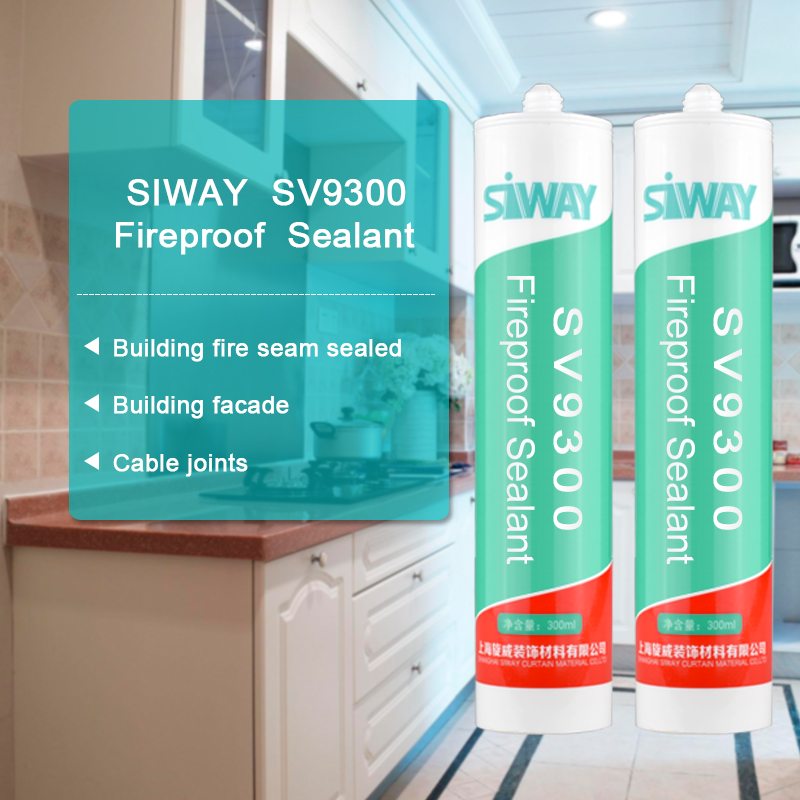China Manufacturer for SV-995 Neutral Silicone Sealant to Albania Manufacturers
Short Description:
Description SV – 995 neutral silicone sealant structure is a kind of one-component, construction curtain wall structure of room temperature curing glue, can be used in all kinds of curtain wall joints and waterproof seal, also can be used for all kinds of aluminum alloy, glass doors and Windows seal assembly Where to use 1.Curtain wall joints and waterproof seal 2.Aluminum alloy, glass doors and Windows seal assembly Key Features 1. 100% silicone 2. Easy to use 3. Waterproofing and...
With our rich experience and considerate services, we have been recognized as a reliable supplier for many international buyers for China Manufacturer for SV-995 Neutral Silicone Sealant to Albania Manufacturers, We fully welcome customers from all over the world to establish stable and mutually beneficial business relationships, to have a bright future together.
Description
SV – 995 neutral silicone sealant structure is a kind of one-component, construction curtain wall structure of room temperature curing glue, can be used in all kinds of curtain wall joints and waterproof seal, also can be used for all kinds of aluminum alloy, glass doors and Windows seal assembly
Where to use
1.Curtain wall joints and waterproof seal
2.Aluminum alloy, glass doors and Windows seal assembly
Key Features
1. 100% silicone
2. Easy to use
3. Waterproofing and weatherproofing
4. Fast curing speed, high strength
5. 12.5% movement capability
Technical data sheet
| Test standard | Test project | Unit | value |
| Before curing——25℃,50%R.H. | |||
| GB13477 | Flow, sagging or vertical flow | mm | 0 |
| GB13477 | surface drying time(25℃,50%R.H.) | min | 30 |
|
GB13477 |
Operating time | min | 20 |
| Curing time(25℃,50%R.H.) | Day | 7-14 | |
| Sealant curing speed and operating time will have different with different temperatures and temperature, high temperature and high humidity can make sealant curing speed faster, rather low temperature and low humidity are slower.21 days after curing——25℃,50%R.H. | |||
| GB13477 | Durometer Hardness | Shore A | 40 |
| GB13477 | The ultimate tensile strength | Mpa | 0.8 |
| GB13477 | Movement capability | % | 12.5 |
Color
Black,White,Gray
Package
300ml in cartridge * 24 per box, 590ml in sausage *20 per box
Shelf life
12 months
Note
If you want the TDS or MSDS or other details, please contact with our sales person.
https://www.drenergysaver.com | 1-888-225-6260
Fifty years ago, before central air conditioners became the norm for cooling US homes, whole house fans were used for that purpose. Installed on the uppermost levels of the house, they were actually big exhausters, which would suck hot air from inside the house and into the vented attic, causing air from the outside to be sucked in through open windows and doors.
The reason why whole house fans became obsolete is that they don’t allow homeowners to really control the temperature or comfort inside the house — like they can do with air conditioners. If the outside air is too hot and muggy, that is the kind of air that will be brought into the home.
Nevertheless, many homes in the U.S. still have whole house fans installed — and whole house fans represent a big gap in the building envelope, and can become a huge source of energy waste during the winter.
Because of a physics phenomenon known as the “stack effect,” a lot of warm air — the air that you pay to heat in the winter — is escaping through that fan, into the vented attic, even when the fan is turned off.
When homeowners no longer use the whole house fan, Dr. Energy Saver usually recommends removing it entirely and patching the hole left in the ceiling with drywall.
Some homeowners, however, still like to use whole house fans to cool the house when the weather outside is nice and comfortable. So what can be done in these cases?
In episode 68 of the On the Job video series, Larry Janesky, shows us how Dr. Energy Saver deals with cases like this. The challenge is to allow the homeowner to use the whole house fan when he so chooses, but also keeping it from becoming a source of energy waste when the heating or air conditioning system is being used.
This particular attic received a lot of upgrades in order to become energy efficient, including an insulated storage deck, can light covers, Rockwool insulation and sealing around the chimney, duct sealing, a cat walk and insulation dams to contain several inches of blown cellulose, as well as professional air sealing.
The whole house fan in this case received a cover made of SilverGlo foam insulation board and completely air sealed. An airtight lid — which can be removed by the homeowner when he turns the fan on — keeps the unit fully functional, while preventing energy waste when the fan is not being used.
Whole house fans are only one of the many energy wasting details Dr. Energy Saver technicians find and fix every day, in homes across the U.S. — and we would love to help you too!
Visit our website or call us to locate a Dr. Energy Saver dealer in your area that can make your home more comfortable and energy efficient.
This is how a microprocessor, the brain ‘behind the magic’ of your PC, is made. For more about process Intel employs in building the chips that power many of the world’s computers, visit https://bit.ly/of-sand.Subscribe now to Intel on YouTube: https://bit.ly/1BZDtpf
About Intel:
Intel, the world leader in silicon innovation, develops technologies, products and initiatives to continually advance how people work and live. Founded in 1968 to build semiconductor memory products, Intel introduced the world’s first microprocessor in 1971. This decade, our mission is to create and extend computing technology to connect and enrich the lives of every person on earth.
Connect with Intel:
Visit Intel WEBSITE: https://intel.ly/1WXmVMe
Like Intel on FACEBOOK: https://intel.ly/1wrbYGi
Follow Intel on TWITTER: https://intel.ly/1wrbXC8
Follow Intel on INSTAGRAM: https://bit.ly/1OJuPTg
Visit iQ: https://intel.ly/1wrbXCd
From Sand to Silicon: the Making of a Chip | Intel
https://www.youtube.com/user/channelintel




